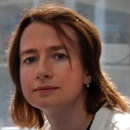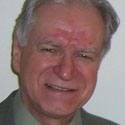Academic Editors
The following people constitute the Editorial Board of Academic Editors for PeerJ. These active academics are the Editors who seek peer reviewers, evaluate their responses, and make editorial decisions on each submission to the journal. Learn more about becoming an Editor.

Hans Martin Senn
Hans Martin Senn obtained his undergraduate and PhD degrees in Chemistry from ETH Zürich. For his undergraduate thesis project in 1996/97, he went to Imperial College, London, where he was supervised by Mike Mingos, who got him into (EHT and DFT) calculations. Back in Switzerland, he did his PhD with Antonio Togni at ETH and Peter Blöchl at the IBM Zürich Research Centre. After a first postdoc with Tom Ziegler in Calgary, he worked in Walter Thiel's group at the Max Planck Institute for Coal Research in Mülheim an der Ruhr (Germany). Since 2007, he has been a lecturer in Theoretical and Computational Chemistry at the University of Glasgow (UK).

Davide Barreca
Davide Barreca is an Associate Professor of biochemistry at the University of Messina. He is specialized in enzyme modulation by natural compounds, inhibition of protein aggregation and activation of signal apoptotic cascade. Most of his research projects concentrate on separation and identification of unknown flavonoids, structural-activity elucidation, and biochemical analysis of their health promoting or cytotoxicity properties on cells culture. He is author of over 110 papers in peer-reviewed journals, 35 chapters in books, and 70 conference proceedings and reviewer of over 40 international scientific journals.

Yashonath Subramanian
Obtained Ph.D. from Indian Institute of Science, Bangalore and then spent time at Department of Chemistry, University of Cambridge, Cambridge and Royal Institution of Great Britain, London and University of Pennsylvania, Philadelphia.
Interests include molecular simulation, computational methods, physical chemistry, intermolecular interaction, phase transitions and diffusion. Visiting Professor at several institutions in Europe and Japan such as University of Sassari in Sardinia, Italy as well as IMR, Sendai University.

Elizabeth G. Laird
My research goals are to characterise the mechanisms of collagenous tissue development, repair and renewal. Current research interests include understanding the dynamics of collagen synthesis and turnover, the role of stem cells in musculoskeletal homeostasis and the role of glucose in musculoskeletal ageing. Tissues of interest are primarily tendon and ligament but include cartilage, bone, cornea and intervertebral disc, as well as fibrotic tissue.
This research is important because age-related degeneration and loss of function in musculoskeletal tissues is associated with chronic joint pain, limited movement, tendinopathy, ligament damage, intervertebral disc degeneration and osteoarthritis. There is both a loss of tissue integrity and propensity to fibrosis indicating that homeostasis of the collagenous extracellular matrix is lost with age. Understanding the molecular processes that create functional musculoskeletal tissues during development and growth, and which malfunction or cease to operate in aged tissues is key to developing new strategies for tissue engineering, to activate intrinsic stem cell repair mechanisms and to develop beneficial pharmaceutical, dietary or exercise-based interventions in an increasingly aged society.

Piotr Chomczynski
Founder, Molecular Research Center, Inc. (MRC). Inventor of the single-step method of RNA isolation. Active in Science to Business projects.
Michael T Lynskey
Professor of Psychiatry at Washington University School of Medicine

Eli N. Perencevich
Professor of Internal Medicine and Epidemiology at the University of Iowa Carver College of Medicine. Director, Center for Comprehensive Access and Delivery Research & Evaluation (CADRE), Iowa City VA Healthcare System. Primary research areas: infection prevention, multi-drug resistant bacteria, Staphylococcus aureus

Andrew P Grieshop
Associate Professor, Department of Civil, Construction and Environmental Engineering, North Carolina State University.
Research interests include the sources and evolution of atmospheric aerosols, characterization of in-use emissions from mobile and stationary combustion sources, linkages between air pollution emissions and climate change, air pollution exposure assessment, technical policy analysis of the environmental impacts of energy systems, and energy and environment in developing countries.

Andreas Brodehl
Dr. Andreas Brodehl is a Principal Investigator at the Heart and Diabetes Center NRW, University Hospital of the Ruhr-University Bochum, Erich and Hanna Klessmann Institute.
His research interests include genetic cardiomyopathies, using different models such as cardiomyocytes derived from induced pluripotent stem cells, and mouse and zebrafish for functional and structural analysis. In addition, he uses explanted myocardial tissue for histology, gene expression and structural investigations.

Giuseppe Parrella
Dr. Giuseppe Parrella is a Senior Researcher at the Institute for Sustainable Plant Protection of CNR, Italy.
Dr. Parrella's primary areas of expertise include plant virology, specifically with particular reference to bio-molecular characterization, diagnostics and epidemiology. He also considers Phytoplasmas and viroids among his study interests.
Dr. Parrella's current research topics include the study of the biological-molecular variability of the main viruses of horticultural, ornamental and aromatic crops; the development and validation of sensitive and highly specific diagnostic methods for the rapid diagnosis of viruses, with particular reference to emerging or recently introduced viruses and spread throughout the national territory (RT-PCR, cold probes, LAMP, real time RT-PCR, etc. .). Other interests of Dr. Parrella concern the research and characterization of sources of resistance to viruses in wild or cultivated germplasm; the use of beneficial microorganisms and their metabolites in the control of viroses; the identification and characterization of mitochondrial variants of Bemisia tabaci and of the associated geminiviruses and endosymbionts; the study of the impact of phytoviruses on human health.

Michael A. Rogawski
Professor, Department of Neurology, School of Medicine; Pharmacology and Toxicology Graduate Group; Center for Neuroscience; University of California, Davis. Past president, American Society for Experimental NeuroTherapeutics. Academic editor of 9 journals. Co-founder of Epilepsy Currents, the journal of the American Epilepsy Society.
I received a B.A. (biophysics) from Amherst College, and M.D. and Ph.D. (pharmacology) degrees from Yale University. I was a resident, fellow and assistant professor in the Department of Neurology at the Johns Hopkins University School of Medicine. For over 20 years, I was a senior investigator and chief of the Epilepsy Research Section at the National Institute of Neurological Disorders and Stroke. My research interests involve ion channel pharmacology and neurological therapeutics, including antiepileptic drugs and other epilepsy treatment approaches.

Shoba Ranganathan
Shoba Ranganathan holds a Chair in Bioinformatics at Macquarie University since 2004. She has held research and academic positions in India, USA, Singapore and Australia as well as a consultancy in industry. She hosted the Macquarie Node of the ARC Centre of Excellence in Bioinformatics (2008-2013). She was elected the first Australian Board Director of the International Society for Computational Biology (ISCB; 2003-5); President, Asia-Pacific Bioinformatics Network (2005-2016) and Steering Committee Member (2007-12) of Bioinformatics Australia. She currently serves as Co-Chair of the Computational Mass Spectrometry (CompMS) initiative of the Human Proteome Organization (HuPO), ISCB and Metabolomics Society and as Board Director, APBioNet Ltd. Shoba’s research addresses several key areas of bioinformatics to understand biological systems using computational approaches. Her group has achieved both experience and expertise in different aspects of computational biology, ranging from metabolites and small molecules to biochemical networks, pathway analysis and computational systems biology. She has authored as well as edited several books in Immunoinformatics as well as contributed several articles to the Encyclopedia of Systems Biology, published by Springer in 2013. She is currently Editor of Elsevier's Reference Module in Life Sciences and Editor-in-Chief of Elsevier's Encyclopedia of Bioinformatics and Computational Biology.

